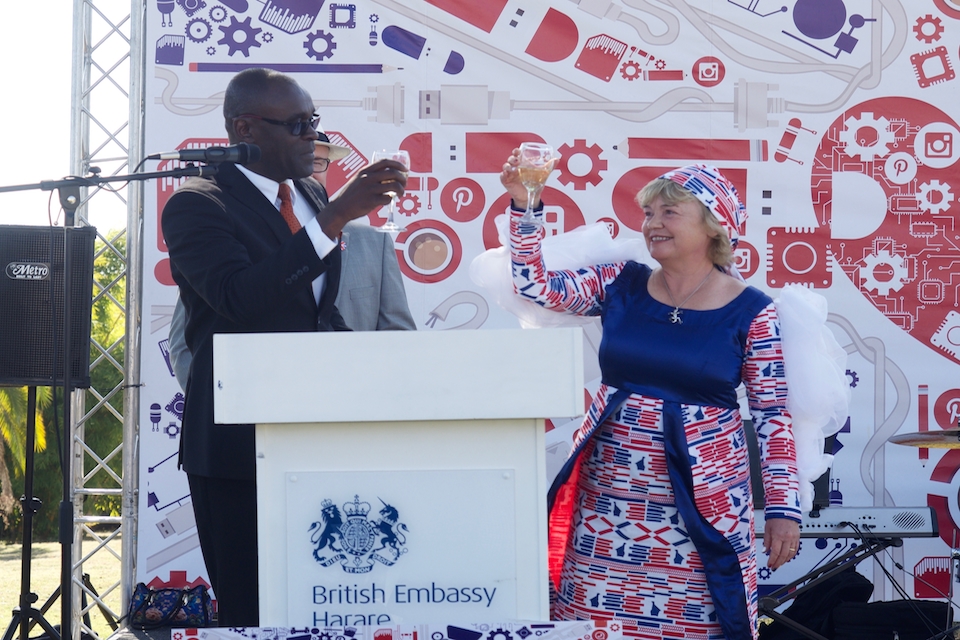Britain celebrates links with Zimbabwe
HMA Catriona Laing stresses Zimbabwe's creative and innovative potential in her op-ed, which was also published in Zimbabwe's leading Sunday newspaper The Standard.

On June 23 I hosted the Queen’s Birthday Party in Zimbabwe. Unlike many countries, the United Kingdom does not have a “national day” or an “independence day”. The Queen’s Birthday Party in Harare is an opportunity for the embassy to celebrate Britain’s relationship with Zimbabwe and how we hope to build on that in the future. Guests came from all walks of life in Zimbabwe, a mixture of races, ages and nationalities.
This year the Queen’s Birthday Party celebrated innovation, technology and creativity because as we look to the future these are the key ingredients of Zimbabwe’s growth and Britain and Zimbabwe’s future trading relationship.
Zimbabwe has had an uneven few years economically. It is not unique. Africa as a whole faces struggles with declining investment and savings, and rising government indebtedness. Even within Africa, the overall picture is mixed. Growth has slowed sharply among oil exporters and north African countries — but many other countries in the rest of Africa have had much stronger growth over the last five years.
Young and growing population
There are reasons to be optimistic. In an aging world, Africa has the advantage of a young and growing population and will soon have the fastest urbanisation rate in the world. By 2030, the countries of Africa will have larger working age populations than China or India. Accelerating technological change is already unlocking new opportunities for consumers and businesses, and Africa still has abundant resources.
An example of this is mobile phone technology. Millions in Africa are already using cellphones and mobile money, leapfrogging land line technology and other fixed infrastructure. The potential for further great leaps forward in business, medicine, education and public administration is high. Mobile technology may account for as much as 8% of GDP across Africa by 2020, with up to 60% of Africans able to access the internet on mobile phones compared to just 2% in 2010. Zimbabwe stands out here. Last year smart phones were being used by about 23% of Zimbabweans and the figure appears to be rising quickly
Aid through cash transfers
We are already using that technology. During last year’s food shortage here in Zimbabwe we delivered aid through cash transfers direct to mobile phones — which we found was much cheaper and less vulnerable to corruption than delivering conventional food aid in lorries.
The Queen’s Birthday Party celebrated this success and potential. We showcased some of the Zimbabwean computer game-makers and cartoonists, fashion designers, the educationists and the tech hubs that make use of modern technology to provide economic growth and boost trade.
Innovative British brands
Britain has always been a trading nation so we will also showcase innovative British brands who are successful in the Zimbabwean market. Some have suggested that Britain is turning its back on the world as it leaves the European Union. Far from it — our ministers remain committed to a vision of global Britain, where we will continue to value trade with Europe but seek to build trading relationships globally, including with traditional partners like Zimbabwe. Britain will continue to be a champion of improved trading conditions for developing countries like Zimbabwe, so their goods and services can access international markets.
The new companies which embrace technology and innovation to the full will probably be smaller and more flexible than the traditional manufacturing giants. There are some choices to be made if Zimbabwe is to seize the economic opportunities that technology provides.
National boundaries less important in global economy
Over the last 18 months the debate over indigenisation laws has ebbed and flowed in Zimbabwe without resolution. What many commentators seem to have missed is that the global economy respects national boundaries less than in the past. Modern companies finance, design, manufacture and market their products and services in many different countries and across many borders. Zimbabwe is entitled to have any indigenisation policy it chooses. But if the laws are too strict or complex, they will dissuade investment from the new generation of tech companies and ultimately cost jobs.
The second issue is around freedom of the internet. Zimbabwe is considering introducing new legislation on cyber-crime. Some legislation may be needed, as cyber crime is a growing threat, but equally ensuring access to the internet is vital for Zimbabwe’s future economy and individual freedom. I have received very clear assurances from the ICT minister Supa Mandiwanzira that the new legislation is not meant to be intrusive. I am grateful for that reassurance.
Openness to new ideas
Perception is very important. If Zimbabwe wants to encourage entrepreneurs it is critical that it communicates openness to new ideas and technology. Internet freedom is often explained as a human rights issue, but as importantly for Zimbabwe the economic cost of getting the legislation wrong needs to be considered.
Zimbabwe is home to a host of talented creatives and technological innovators. We celebrate them today — and the hope that they offer for the future of this great country.